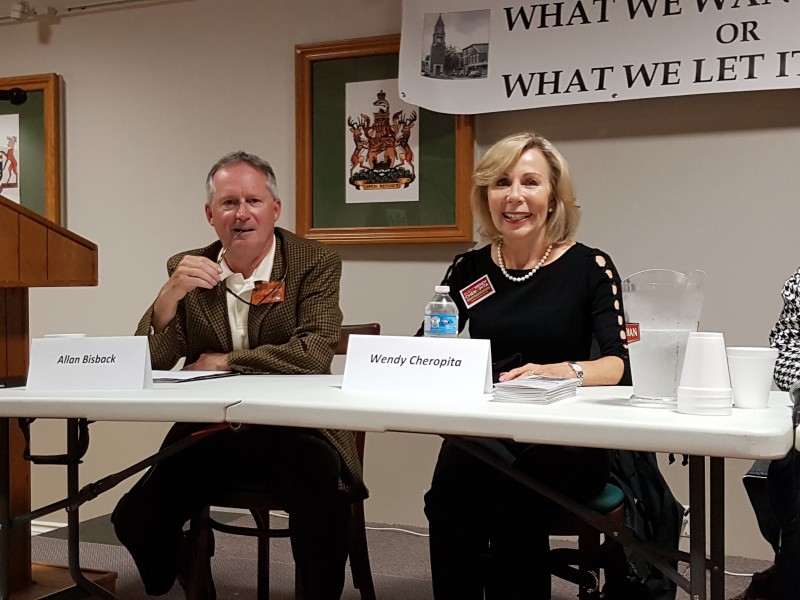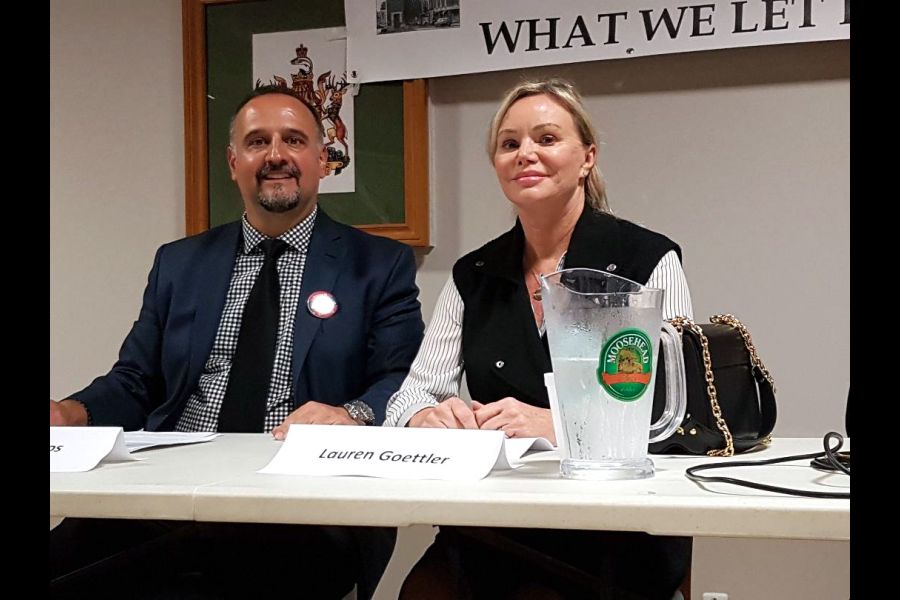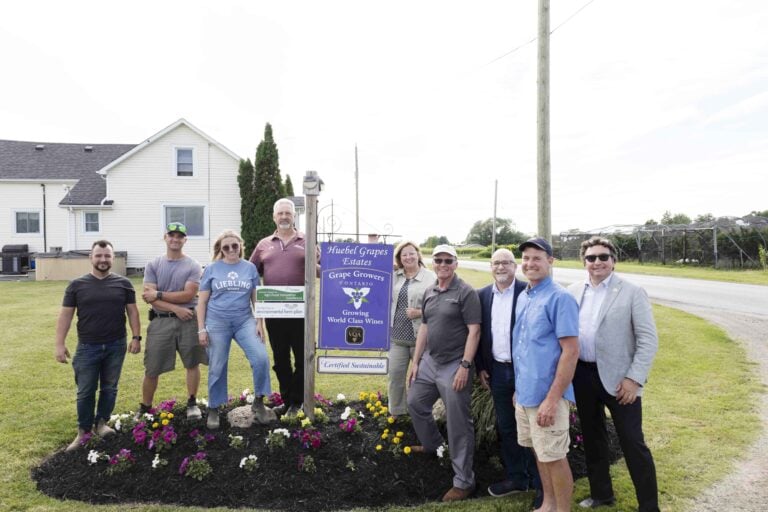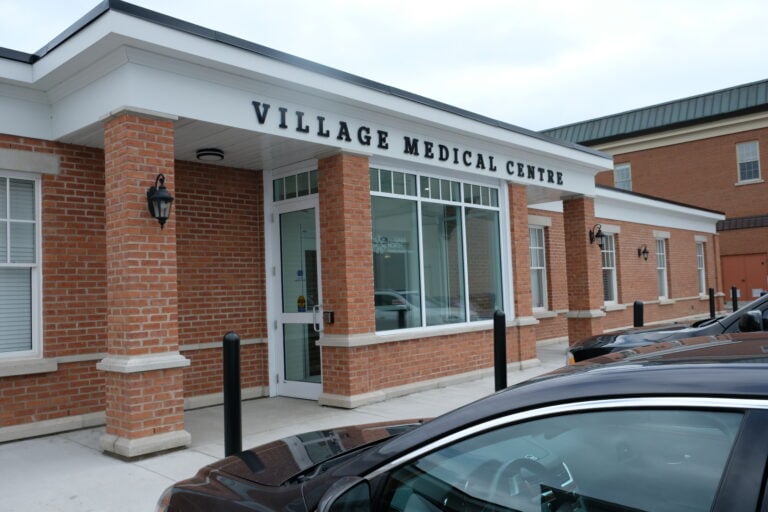At the fourth and final meeting for new candidates hosted by FocusNOTL at the Royal Canadian Legion hall last Tuesday, Gus Koroneos, Crispin Bottomley, Mark Brown, Lauren Goettler and Katherine Reid answered questions that dealt with what they could deliver to council, and whether they would support freezing development or privatizing public services.
Reid introduced herself as a Queenston resident with a career in the wine industry, now winemaker for Joseph’s Estates Winery. She is the president of the Garden City Lions Club, has been on its board since 2000 and has served two terms as regional chair of the Niagara division. She volunteers to help with local youth dances the NOTL Lions Club holds at Crossroads Public School, and collects eye glasses to be sent to underdeveloped countries.
She is also a member of the Town’s safety committee, which tackles road safety issues, bike tours, e-scooters, crosswalks, speed limits, and know-your-neighbours programs. The committee, which recently published a safety map for pedestrians and cyclists, does “great work” to help the community, including an annual event to improve bike safety for migrant farm workers, Reid said.
As a member of the Town’s agricultural committee, she’s concerned about the changes she’s seen in agriculture, she said. There have been several maps made for planning purposes that are not correct and don’t match.
Her greatest concern is the Town’s planning department. Designing a new Official Plan requires a good town staff and a few councillors who understand the planning process. “I feel I have a good understanding of the Town planning department,” said Reid.
She supports heritage and cultural preservation, which have been important to her since she was in school.
Town bylaws need to be consistent, Reid said, and all that NOTL has, including the Shaw Festival, the Icewine Festival, the Niagara River and Lake Ontario contribute to the many reasons visitors come here and have a good experience. She would like to see more done to promote agri-tourism, and to give small producers more recognition, even if it’s a Facebook page to share information.
She has run many conferences around Ontario with the Lions Club, has won an award for helping youth through her work with local Lions, and lives by the Lions motto: “To be careful with my criticism and liberal with my praise, to build up and not destroy.”

Crispin Bottomley said he is running because he wants the very best for the town. The last 20 years of his life, he said, have been building up to this point of running for office.
He was youth citizen of the year in 1998, he’s a graduate of Brock University with degrees in political science and education, a volunteer firefighter, president of the Queenston Fire Department Association, co-chair of the health and safety committee, associate instructor at the Ontario Firefighting College, and was vice-chair of the Town’s parking committee.
The Official Plan needs to be completed with development and growth in mind, he said.
He would support heritage protection and the agricultural base, cautious management of tourism, growth, and Glendale intensification.
“I want the people in this town to be proud of it.”
Increased traffic problems are not limited to Regional Rd. 55 — there are also problems in St. Davids, Queenston and Niagara-on-the-Green, he said. The Town needs to work with Niagara Falls and the Niagara Region to open up Concession 6 to Mewburn Road, and alternate routing using concessions and lines should be considered. As a pilot project he would like to see a police officer at the Queen and King Streets intersection, to control pedestrian and vehicular traffic.
Bottomley said he would like to see discussions with the Region to download RR 55 so the Town could regain control of a principle entrance to NOTL, as well as the resurrection of the Town’s parking committee, a discussion about whether there is sufficient parking for businesses, employees, customers and Niagara College students, and whether there would be support for satellite parking lots.
Also on his list of priorities is looking at the sewage lagoons, the rifle range and DND property, the former Parliament Oak property, the town-owned land behind the former high school, and the community centre property, and he said he would like to see the facilities and recreation master plan finalized early in the next term of council.
Age-friendly and accessibility issues also need to be examined, he said, with a Town committee to look at whether public facilities will meet Provincial accessibility requirements by 2025.
The Official Plan needs to looked at with a vision for the next 20 years, said Bottomley.
“The town has changed since the current plan was completed in 1993. The Town hasn’t kept up with the changes, and that’s what we’re seeing now.”
Mark Brown, having lived in NOTL for two-and-a-half years, introduced himself as “the new kid on the block.”
However he and his wife honeymooned in NOTL and have celebrated their anniversary in town for the last 39 years. “This was our happy place,” he said, so when it came to retirement, NOTL was where they chose to live.
Brown spent two terms on the Oakville town council, he said, helped finalize the Oakville secondary plan, and served on “I don’t know how many budget committees.”
He also spent six years on the Oakville Chamber of Commerce board of directors and one year as board chair.
Over the past few weeks, knocking on doors and speaking to people, he’s heard about a lot of issues — traffic, development, council not listening to residents who feel disenfranchised, “but I haven’t spoken to anyone who disagrees this is the best place to live.” That means the Town can still deal with issues, that everyone is on the same page going forward, he said.
Getting the OP up-to-date will not be the end of the process, requiring Regional approval, and there will always be legacy projects grandfathered in that will pop up under old rules, he said.
Council needs to work on a strategic plan to set direction for staff and residents, looking at where the Town should be in the next 10 years. It has to be clear, has to protect heritage and establish urban guidelines, Brown said. He supports the community planning permit system, which will be different for each village. It must be put in place “to provide fence posts to move forward.”
He would also like to see a master plan of parks and facilities for the future, to inform development charges. The pressure to build is coming, he said, because it’s relatively cheap to build in NOTL in comparison to municipalities such as Oakville. The Town needs to have projects and goals in place to justify development charges.
Turning to taxation, Brown said he’s very comfortable with a line-by-line look at the budget. He’s familiar with discussions and debates over numbers, including looking at service levels such as consultants, which he says should be used in some cases but not all.
He doesn’t agree with the accommodation tax because it targets the visitors the town wants, the ones who come to stay. But there has to be something in the planning process about how many tourists the town wants, how to manage them, and the infrastructure required to support tourism, he said.
Brown suggested undertaking a traffic study that would include tracing licence plates to track where visitors come from and how long they stay.
He said he feels “something is smoldering,” with the Province likely looking at a regional review that could include police costs. But municipalities can also expect to be part of the review, he said, referring to the 1970s when several municipalities in Ontario “were wiped out overnight.”
The ward system is a possibility for the next election, Brown said, “but we have to deal with disenfranchised residents now and not wait for that solution.”
Cannabis legislation and retail outlets have to be considered; urban boundaries, the agricultural sector and tourism have to be protected; and the grape and wine industries “are integral for our quality of life,” said Brown, who promised to be accessible to residents, “because that’s what we’re being paid to do.”
Goettler said she moved to NOTL three years ago, loves the town, and has since she was married here years ago. She loves the people, history, architecture, wineries and culture, in addition to the proximity to water. “What’s not to love?”
But recently the Town has been challenged with questionable applications for “demolition of some treasures,” and the Town hasn’t been able to make decisions to control unwanted growth.
She and her husband own eight businesses with 270 employees, so “I know how to run a business,” she said, including making difficult decisions and prioritizing needs over wants.
Goettler says she feels she can help guide the town over the next four years in a positive direction, and since she isn’t looking for a job, she will donate her salary to charity.
She would support a tree bylaw, and an accommodation tax to help preserve what is special about the town, she said.
Growth should be thoughtful and shouldn’t compromise. She believes a ward system could be considered in the future, but “right now the town needs to come together.” A fresh face and new approach is needed on council, she said, promising to represent all stakeholders, not just special interest groups in town.
Koroneos is from the Niagara Region, and was raised on a poultry farm in Smithville. He has an honours science degree from University of Waterloo, and has opened hearing clinics in Niagara Falls and Virgil.
His two little girls are his inspiration for running for council — he wants to help guide the town for the next generation.
The Town should be planning for what residents want it to look like 30 years from now, and work toward that, he said, quoting Buckminster Fuller, who said “the best way to predict the future is to design it.”
He’s not in favour of expanding urban boundaries, and would work with farmers to help them promote their product. Their farms need to be viable and successful so they can pass them on to the next generations. He’s also not a fan of putting greenhouses on prime agricultural land.
He would push for a value-for-money audit, especially with what’s happening at the Region, he said, since the Town is disproportionately taxed for the services it receives.
The Town needs to invest for the future in infrastructure, get help from the Region to improve Regional Rd. 55 and Four Mile Creek Road, needs to improve transit for seniors and those with disabilities, and needs a wheel-transit service.
The Town also should develop the Niagara District Airport with more flights to more destinations, he said.
Koroneos, who lives in St Davids with his family, said the Town doesn’t need to spend $100,000 on consultants for the St. Davids Pool, as councillors agreed to recently, but rather should spend the $100,000 toward a pool.
As for trees, he said, the best time to plant them was 20 years ago, “and the next best time is today.”
He asked for support from voters “so we can all enjoy those beautiful, mature trees 20 years from now.”
Reid was asked the first question of the evening, which was what the “single most important deliverable” was she could bring to council. Her answer was assisting people in the community, by listening what they have to say and working for them. “I believe I listen well.”
Bottomley said he would bring committment, which he said he’s shown previously through his actions and commitment to the community.
Brown said he would listen to both sides of a debate before making the best decision possible for all residents, which is ultimately what councillors are elected to do.
Goettler, referring to a meeting that packed the community centre to talk about the Randwood Estate last spring, said when you see that, as a councillor you should listen. As a new councillor, she said, “what I don’t have in experience I will make up for in communication.”
Koroneos said his most important deliverable would be controlling development with an equitable Official Plan. He is unbiased, he said, and looks at data to drive his conclusions. “That way I can defend my conclusions to residents.”
The next question was whether council should freeze development until guidelines are in place, and all responded they would not.
Bottomley suggested slowing new development by ensuring a number of steps, including public consultation. “We would not be able to stop development, but we need to have our Official Plan and secondary plans in place the first year of the new term.”
Brown said it would be “wonderful” if a town could stop development. Unfortunately it can’t be done but there are mechanisms to slow it, by controlling sewer and water allocations within the urban boundaries. “Don’t agitate for more sewage capacity to be built,” he said. “I believe we’ll have a very co-operative council” who will work together to get the Official Plan done.
“I don’t think we can stop it, but I’m not sure that we can’t slow it down,” said Goettler, suggesting the Town should arrive at a vision of what NOTL should look like before handing out building permits.
Koroneos agreed development can’t be stopped, but can be controlled. Urban boundaries need to be preserved, and he would push for a mid-peninsula corridor that would curb local development as a “next-generation plan.”
Ried too agreed the Town can’t stop all development but through infrastructure decisions could slow it down.
Asked if he would agree with privatization of public services, Brown said he would look at each service to see if it makes sense. Typically, he said, government looks after the services that are so expensive no one else can do it profitably. Snow ploughing, he said, might be cheaper handled by the private sector. “If it makes sense, contract it out, if it doesn’t, don’t.”
Goettler agreed if a service can be delivered more cheaply by the private sector, privatize it — look at it and do whatever’s best for tax dollars.
Koroneos said it would have to be looked at on a case-by-case basis, with a focus on value for money. Any privatized service would need careful scrutiny to ensure the Town isn’t being short-changed.
Reid agreed privatization could be beneficial in some cases, but not always. She pointed to hospital cleaning as an example of privatizing a service that might be cheaper but not better.
Bottomley said privatization is a possibility but public-private partnerships should also be considered, and the town staff would need to be ready to monitor privatized services.
Goettler, asked about the delivery of health care in NOTL, said she’s not crazy about it. When you move to town you don’t get a choice of doctor in the family health team, you have to take who is available, she said, and you’re not able to switch within the same practice. She is in favour of having all the doctors and services in one building, although she’s not sure it’s going to be in the best location.
“It’s definitely a hassle” trying to get a new doctor, agreed Koroneos, and the Town needs to do a better job of attracting more doctors, both family physicians and specialists.
Reid also likes the idea of having all doctors and services under one roof, but she doesn’t like the location they chose, because of safety concerns with its location beside a school.
Bottomley spoke of not having enough long-term care beds, given the expected closing of Upper Canada Lodge, although Pleasant Manor is getting more beds. He would also like to see more doctors encouraged to relocate to NOTL.
Brown says as the population grows, the Town needs to work with the Local Health Integration Network to attract new doctors and specialists. Although the Province says the town is adequately serviced, now is the time to recruit for the future, he said.
Asked about an urban tree bylaw and whether there should be one for the rural areas as well, Koroneos said a tree bylaw should be incorporated in the Official Plan. While most property owners want mature trees on their property, the Town needs something in place to prevent people from doing something “radical.” Anything dealing with rural areas would have to recognize that farmers have a responsibility to provide “good stewardship” on their land.
The Town needs an urban tree bylaw, said Reid, but it should be more practical and less expensive for residents than the one council was considering and rejected. There should be no need for an arborist, she added, suggesting possibly the Town’s agricultural committee could help.
Bottomley agreed there should be two separate bylaws, that trees on private property need to be managed, and if a tree is causing is a safety issue a property owner should be allowed to remove it.
The tree bylaw the previous council was considering was an intrusion on people’s property rights, said Brown. Most residents would act responsibly, and the requirement for an arborist needs to be looked at. Root protection during construction is a concern, he said, “but I’d have a hard time telling someone they can’t put a pool in their backyard because of a tree.”
Goetter said she is “100 per cent “in favour of a tree bylaw, and she doesn’t find the one proposed to council too intrusive. If you have a sick tree, she said, you get a permit to remove it. If you have a healthy tree, you have to have a good reason to take it down. And if you have a mature property and want to take trees down, “maybe it’s not the property for you.”










